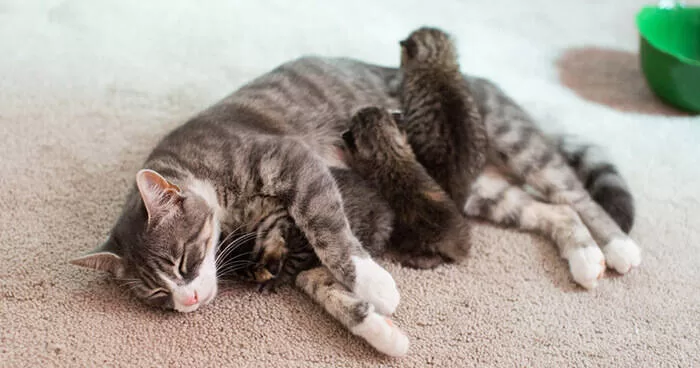Heat in female cats is a natural process that involves a series of hormonal and behavioral changes. During this period, reproductive hormones are at their highest levels and the female cat seeks to attract male attention. This phase may present symptoms such as bashful behavior , increased attention seeking, more frequent urination, loud meowing and purring with a strong odor.
The duration of heat can vary from cat to cat, but generally lasts from 5 to 20 days. This period can be influenced by environmental factors, such as the presence of other male cats in the region. It is important during heat to prevent the cat from going outside and meeting male cats to avoid unwanted pregnancies and prevent diseases.
One of the most effective ways to avoid unwanted pregnancies and properly care for your cat is through neutering . In addition to being a preventive measure, neutering brings benefits to the cat’s health, such as reducing the risk of breast cancer and uterine infections.
During pregnancy , it is essential to offer quality food , rich in essential nutrients. This will ensure the healthy development of the kittens and the well-being of the cat herself. It is important to consult a veterinarian for proper dietary guidance during this time.
On the day of birth, the cat will look for a quiet and private place to give birth. It is essential to be aware of signs of danger or complications during birth and, if necessary, seek immediate veterinary assistance.
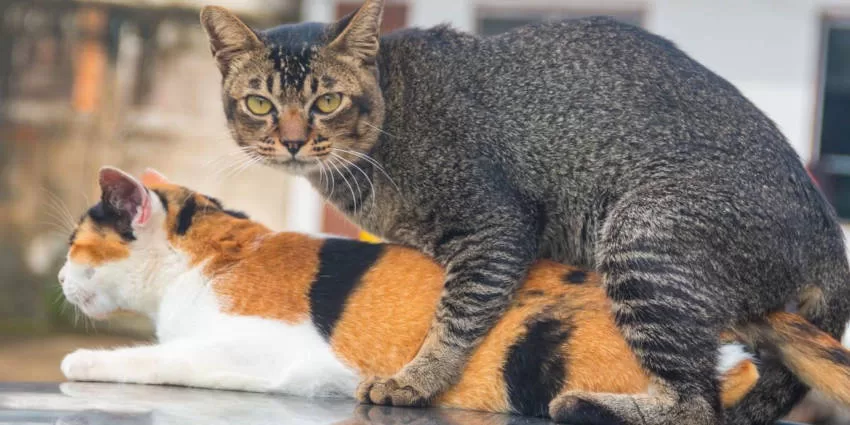
After birth, puppies should be kept in a quiet and safe environment . Vaccination of puppies should be started from six weeks of age, following the schedule recommended by the veterinarian to ensure health and protection against diseases .
Main points
- Heat in female cats is a natural process that involves hormonal and behavioral changes.
- Symptoms of heat include bashful behavior , attention seeking, frequent urination, loud meowing and purring with a strong odor .
- The duration of heat can vary from 5 to 20 days, depending on environmental factors.
- Castration is a recommended measure to avoid unwanted pregnancies and prevent diseases.
- During pregnancy, it is important to offer a quality diet to guarantee essential nutrients.
- On the day of birth, the cat looks for a quiet and private place, and you need to be alert for signs of danger.
- Vaccination of puppies should start from six weeks of age .
Heat in female cats: symptoms and behavioral changes
During heat, cats may present a series of symptoms and behavioral changes that are characteristic of this period. It is important that owners are aware of these changes to provide adequate care for their cat.
One of the most common symptoms of heat in cats is bashful behavior . They tend to seek more attention from their owners, rubbing against their legs and meowing more frequently. Additionally, they may meow loudly and purr with a strong odor.
Another common behavioral change is more frequent urination. During heat, female cats have the habit of urinating in strategic locations to attract males. Therefore, it is important to be aware of possible urine markers at home.
To keep your cat safe during heat, it is essential to prevent her from going outside or coming into contact with male cats. This can be done by keeping her in a controlled and supervised environment. Furthermore, castration is a recommended option to avoid unwanted pregnancies and prevent diseases.
In the next topic, we will look at the duration of heat in female cats and the factors that can influence this period.
| Symptoms of heat in cats | Behavioral changes |
|---|---|
| bashful behavior | Search for attention |
| More frequent urination | Loud meows |
| Strong odor when purring | – |
Duration of heat in female cats
Heat in female cats generally lasts between 5 and 20 days, but it is important to remember that this duration can vary according to different factors. During this period, the cat goes through hormonal changes that make her more receptive to males and seeks their attention. These changes can be noticed by bashful behavior, increased vocalization, loud meows and a strong odor when purring.
To better understand the duration of heat in female cats, it is necessary to consider the action of external stimuli, such as the presence of male cats in the area. When a female cat comes into contact with a male, she may go into what is called interrupted heat, in which the period of receptivity is shortened. Likewise, if the cat does not find males during heat, the period may extend beyond 20 days.
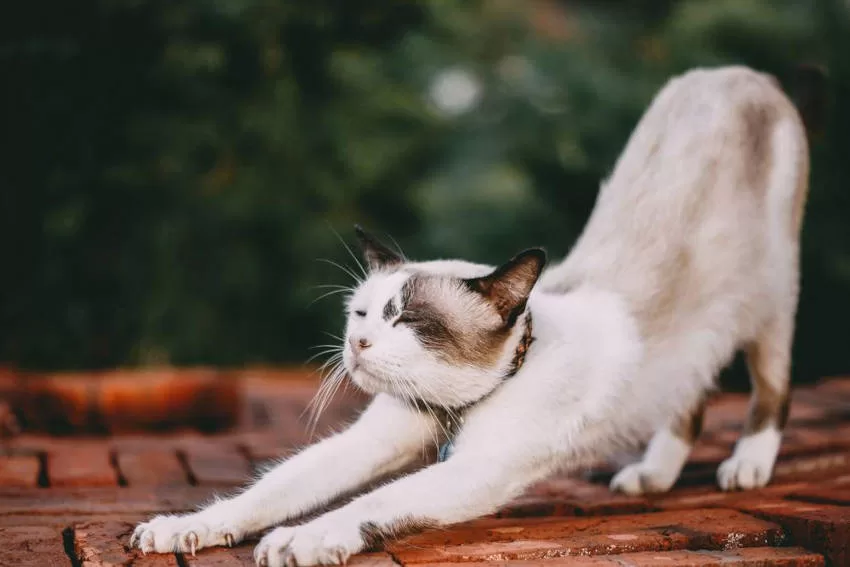
To avoid unwanted pregnancies and prevent diseases, it is recommended to neuter the cat. Castration is a safe procedure that helps control heat and related behaviors. Furthermore, neutering brings benefits to the cat’s health, reducing the risk of breast cancer and uterine infections.
| Factors that influence the duration of heat in female cats: |
|---|
| External stimuli |
| Presence of male cats |
| Interaction with males during heat |
In short, heat in female cats is a period when reproductive hormones are high and the cat changes her behavior to get the attention of males. The duration of heat can vary from 5 to 20 days, but external factors can influence this time. Castration is a recommended option to avoid unwanted pregnancies and prevent disease. It is important to always consult a veterinarian for more information and guidance on heat in female cats.
How to properly care for a cat in heat
During heat, it is essential to provide special care to ensure the cat’s well-being and safety. This phase is characterized by behavioral changes and specific symptoms, and it is important to be aware of this to provide a comfortable environment and minimize stress.
One way to properly care for a female cat in heat is to prevent her from going outside or coming into contact with male cats. This is essential to avoid unwanted pregnancies and prevent diseases transmitted by other animals. Keeping the cat in a safe and controlled environment is essential during this period.
Additionally, neutering is highly recommended as a form of population control and to improve the cat’s long-term health. Neutering helps reduce the risk of breast cancer and uterine infections, as well as reducing unwanted behaviors associated with heat.
Food also plays an important role in caring for a cat in heat . Offering a balanced, quality diet is essential to provide the necessary nutrients during this phase. Consult a veterinarian for guidance on the best food for your cat in heat .
| Essential care for a cat in heat |
|---|
| Keep the cat in a safe and controlled environment |
| Prevent the cat from going outside or meeting male cats |
| Consider castration as a form of population control and to improve health |
| Offer a quality and balanced diet |
Remember that each cat may react differently during heat, so it is important to observe your cat’s individual signs and behaviors. If you have any questions or concerns, always consult a veterinarian for personalized information and guidance.
Preventing unwanted pregnancy: the importance of castration
Neutering is essential for preventing unwanted pregnancies in cats and offers additional benefits for the animal’s health and well-being. During heat, cats are more likely to get pregnant, as their reproductive hormones are high and they are looking for sexual partners.
Neutering is a simple surgical procedure in which a cat’s reproductive organs are removed. In addition to preventing unwanted pregnancies, neutering also helps reduce the risk of certain diseases, such as breast tumors and uterine infections.
By neutering a female cat, we eliminate the possibility of her going into heat and, consequently, reduce her desire to leave the house and meet a male cat. This prevents her from being exposed to possible accidents, fights and diseases transmitted by other animals.
It is important to highlight that castration can be carried out at any stage of the cat’s life, but it is recommended that it be done before the first heat, from six months of age. Always consult a veterinarian for more information about procedures and post-operative care .
Food during heat and pregnancy of cats:
During heat and pregnancy in cats , it is essential to offer a balanced diet rich in nutrients to ensure the health of the mother and kittens. An adequate diet during this period contributes to the healthy development of the kittens and the cat’s well-being.
It is important to provide a complete and balanced diet, which includes quality foods specifically for cats in heat and pregnant cats. These foods are formulated to meet the specific nutritional needs of these stages of a cat’s life, providing essential nutrients such as proteins, vitamins, minerals and fatty acids.
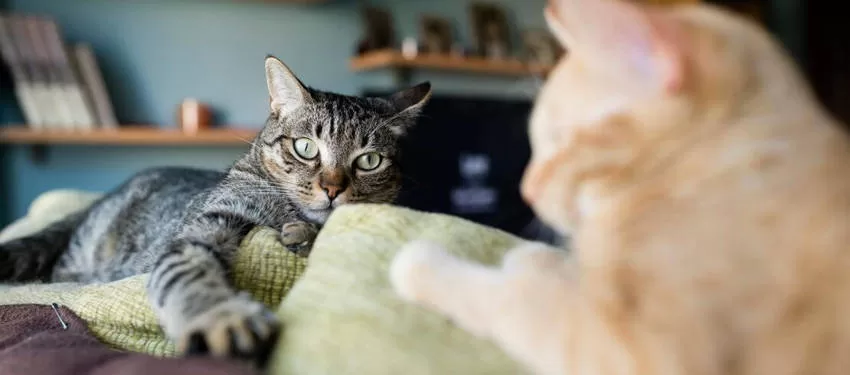
Furthermore, during heat and pregnancy, it is important to offer food in small portions throughout the day, instead of large, spaced meals. This helps ensure adequate nutrient intake and prevents the cat from being hungry for long periods.
| Main nutrients to consider during heat and pregnancy in cats: |
|---|
| High-quality protein: essential for the proper growth and development of puppies. |
| Taurine: important for eye and heart health. |
| Omega-3 and Omega-6: contribute to the health of skin, hair and the immune system. |
| Folic acid: important for preventing birth defects in puppies. |
| Calcium and phosphorus: essential for bone and dental health. |
It is essential to consult a veterinarian for specific guidance on adequate nutrition during heat and pregnancy in cats . The professional will be able to recommend the best diet, taking into account the cat’s individual needs and her general health.
Cat giving birth: warning signs and necessary care
Cat birth is a delicate moment that requires special attention and care to ensure the health and well-being of the mother and kittens. Knowing the warning signs and being prepared to act is essential to the success of this process.
Some signs indicating that birth is near include the cat looking for a quiet and private place to settle down, restlessness, different vocalizations and increased respiratory rate. The cat may also lose its appetite in the hours before giving birth.
It is important to prepare a calm and safe environment for the birth, providing a clean maternity box lined with soft cloths. Make sure the crate is in a quiet place, away from noise and other activities in the house.
When the birth is underway, you need to avoid interfering unnecessarily. The mother will instinctively groom her puppies, licking them to stimulate breathing and cutting the umbilical cord. However, if a puppy is not developing well or the mother is experiencing difficulties, it is important to seek veterinary help immediately.
| Warning signs during cat birth: | Necessary care during childbirth: |
|---|---|
| Absence of contractions for more than two hours | Maintain a calm and safe environment |
| Cat demonstrating prolonged pain without progress | Allow the cat to handle labor naturally |
| Presence of excessive bleeding | Observe the mother and puppies discreetly |
| Prolonged interval between the birth of puppies | Seek veterinary help in case of complications |
A peaceful and safe environment
The environment where birth takes place plays a fundamental role in the health and well-being of the mother and puppies. It is important to provide a safe and quiet place, where the cat feels comfortable and protected. Keep the maternity box in a space away from noise, drafts and other pets.
Additionally, avoid interfering excessively during the birth process. The cat is naturally equipped to care for her kittens and, in most cases, everything goes smoothly and without complications. Offer support and observe discreetly, intervening only if necessary.
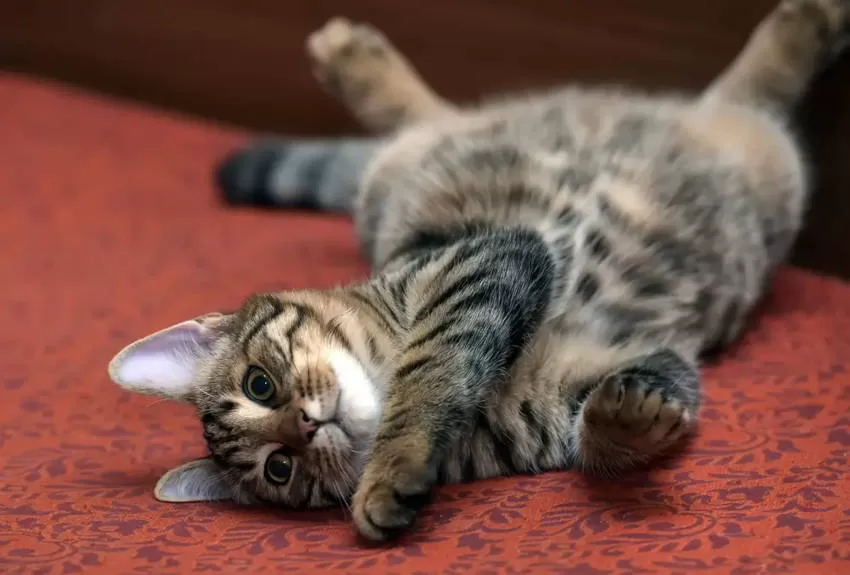
Always remember that each cat is unique and may have different birth experiences. Be present, offer support and be prepared to seek veterinary assistance if complications arise that require professional intervention.
Cat birth is a special and exciting time. With adequate care, you will be contributing to the health and well-being of the mother and puppies, making this experience peaceful and safe for everyone.
| Cat giving birth: warning signs and necessary care | |
|---|---|
| Warning signs during cat birth : | Necessary care during childbirth: |
| Absence of contractions for more than two hours | Maintain a calm and safe environment |
| Cat demonstrating prolonged pain without progress | Allow the cat to handle labor naturally |
| Presence of excessive bleeding | Observe the mother and puppies discreetly |
| Prolonged interval between the birth of puppies | Seek veterinary help in case of complications |
Postpartum care: calm environment and puppy vaccinations
After birth, it is essential to provide a calm and safe environment for the mother and puppies, in addition to starting the appropriate vaccination schedule. The cat needs a calm and reserved space to recover from birth and care for her kittens. Avoid sudden movements and excessive noise that could stress the mother and disrupt the development of the puppies.
The temperature of the environment is also important. Make sure the area where the cat and kittens stay is warm enough, as newborns cannot yet regulate their own body temperature. You can use a heating lamp or a thermal blanket to ensure adequate thermal comfort.
Vaccinating puppies is essential to prevent diseases and ensure their health. The vaccination schedule varies according to the veterinarian’s recommendation, but generally starts from six weeks of age. Vaccines are administered in multiple doses, spaced a few weeks apart, to ensure correct immunization.
Vaccination schedule for kittens
| Puppy age | Recommended vaccines |
|---|---|
| 6 weeks | First dose of V3 vaccine (feline triple) |
| 9 weeks | Second dose of V3 vaccine |
| 12 weeks | Third dose of V3 vaccine and first dose of rabies vaccine |
| 15 weeks | Second dose of rabies vaccine |
It is important to respect the isolation period and avoid contact between puppies and other animals until they are fully immunized. Additionally, consult a veterinarian for specific guidance on proper puppy feeding and other essential care to ensure their healthy growth.
The importance of vaccinating kittens
Vaccinating kittens is essential to protect them from diseases and ensure healthy development. Just like humans, kittens are also susceptible to various illnesses, some of which can be serious or even fatal. Through adequate vaccination, it is possible to prevent the occurrence of these diseases and provide puppies with a long and healthy life.
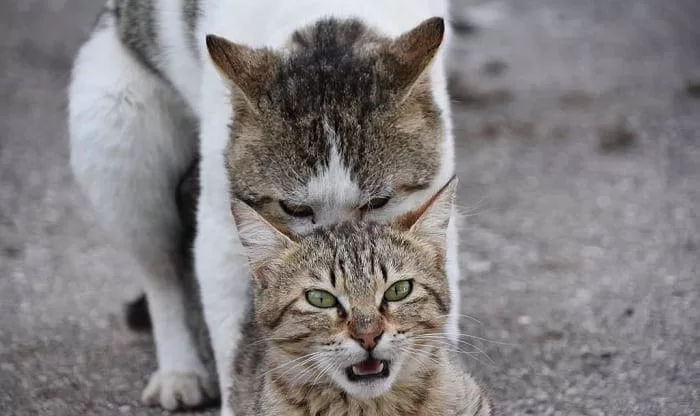
It is crucial that puppies begin receiving adequate vaccinations from six weeks of age. During this early phase, kittens still have a fragile immune system and are more prone to contracting illnesses. Vaccines will stimulate the production of antibodies in the puppies’ bodies, strengthening their natural defenses against pathogens.
There are several common diseases in cats that can be prevented through vaccination, such as feline viral rhinotracheitis, calicivirosis, feline panleukopenia and chlamydiosis. These diseases cause symptoms such as fever, cough, sneezing, loss of appetite and can lead to serious complications. With proper vaccination, puppies are protected against these viruses and have a greater chance of growing up healthy and disease-free.
| Vaccine | Age for Administration |
|---|---|
| V5 | 6 to 8 weeks old |
| V4 | 10 to 12 weeks of age |
| V3 | 14 to 16 weeks of age |
It is important to highlight that the vaccination of female cats must be carried out by a trusted veterinarian, who will assess the health status of the puppies and determine the most appropriate vaccination schedule. Furthermore, vaccines must be administered according to the professional’s recommendations, following the correct intervals between doses to ensure the effectiveness of the immunization.
By ensuring adequate vaccination of kittens , owners are providing the necessary protection so that they grow up healthy and disease-free. Furthermore, they contribute to reducing the spread of diseases and creating a healthier feline population as a whole.
Final considerations
Throughout this guide, we discuss the main aspects related to heat in female cats and the essential care during this period. Heat is a natural moment in a cat’s life, but it can bring significant behavioral changes. It is important to be aware of the symptoms of heat, such as bashful behavior, loud meows and the search for attention.
The duration of heat can vary from cat to cat, but generally lasts from 5 to 20 days. During this period, it is essential to take measures to prevent the female cat from meeting male cats, as preventing unwanted pregnancies is essential. Castration is a recommended option not only to avoid unwanted reproduction, but also to prevent diseases related to the reproductive system.
Furthermore, during heat and pregnancy, adequate nutrition is essential. Providing a quality diet, rich in essential nutrients, will contribute to the health of the cat and her kittens. It is important to highlight that childbirth is a delicate moment and requires special attention. The cat will look for a quiet and private place to give birth, and it is essential that we pay attention to warning signs and provide a safe environment.
After birth, puppies should be kept in a quiet and comfortable environment, and vaccinations should begin from six weeks of age. Vaccination is essential to protect kittens against disease and ensure their health and well-being.
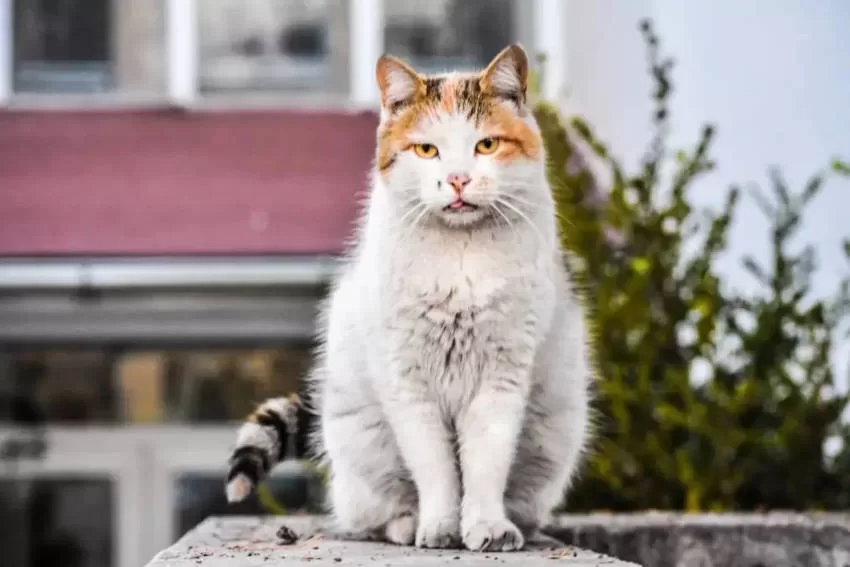
By following these guidelines and properly caring for a cat in heat, you will be contributing to her well-being and ensuring a healthy life for her and her kittens. Always remember to consult a veterinarian for specific advice for your pet. Take good care of your cat and provide her with all the care and affection she deserves.
FAQ
Q: What are the symptoms of heat in female cats?
A: Symptoms of heat in female cats include bashful behavior, attention seeking, more frequent urination, loud meowing and purring with a strong odor.
Q: How long does heat last in female cats?
A: Heat in female cats can last from 5 to 20 days, varying according to environmental stimuli.
Q: What should I do during my cat’s heat to avoid unwanted pregnancies?
A: During heat, it is important to prevent the cat from going outside or meeting male cats. Castration is also recommended to avoid unwanted pregnancies and prevent diseases.
Q: How important is neutering to prevent unwanted pregnancies in cats?
A: Neutering is essential to prevent unwanted pregnancies in cats, as well as offering additional benefits, such as preventing diseases and unwanted behaviors.
Q: How should I care for my cat during heat?
A: When caring for a cat in heat, it is important to control her behavior and keep her safe indoors. Consult your veterinarian for specific advice.
Q: What precautions should I take during pregnant cats?
A: During pregnancy for cats, it is important to offer quality food to ensure the necessary nutrients. Consult your veterinarian for guidance on proper nutrition.
Q: What should I do on the day my cat gives birth?
A: On the day of birth, make sure the cat has a quiet, private place to give birth. Be alert for signs of danger and consider seeking veterinary assistance if necessary.
Q: How should I care for kittens after giving birth?
A: After birth, puppies should be kept in a quiet, safe environment. Consult your veterinarian for guidance on proper care for puppies.
Q: When should I start vaccinating kittens?
A: Vaccination of kittens should begin at six weeks of age. Consult your veterinarian to receive the appropriate vaccination schedule.
Q: What are the final considerations about heat in cats and the necessary care?
A: Final considerations include the importance of understanding the symptoms of heat, providing appropriate care during heat, preventing unwanted pregnancies through neutering, and ensuring the health and safety of the mother and puppies.
Source Links
- https://www.petz.com.br/blog/pets/gatos/gestacao-de-gato/
- https://www.petz.com.br/blog/pets/gatos/gata-no-cio/
- https://www.royalcanin.com/pt/cats/health-and-wellbeing/o-cio-da-gata

